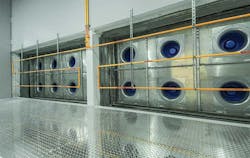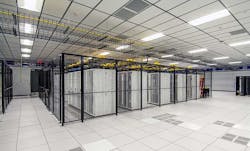As data center providers continue to announce new capacity in the Phoenix market, one leading player has quietly snapped up a large parcel of land for a future hyperscale campus.
Compass Datacenters has acquired more than 200 acres of land in Goodyear, Arizona, with 90 megawatts of capacity immediately available for an anchor tenant, and the ability to ultimately build up to 350 megawatts of data center capacity at the site.
Compass hasn’t made any public announcements about its property in Goodyear, about 20 miles West of Downtown Phoenix. That’s consistent with Compass’ low-key approach to its hyperscale computing initiative, in which it prefers to work behind the scenes with customers on their requirements. Compass says the site is served by three diverse fiber paths, including dark fiber route to Phoenix’ primary carrier hotel at 120 East Van Buren.
The Phoenix data center market is experiencing a building boom. Earlier this week Vantage Data Centers announced that it had acquired 50 acres in Goodyear, just up the street from the Compass property. Compass and Vantage join a large and growing group of data center providers deploying new capacity in the Phoenix region, with plans for more 700 megawatts of future capacity (more than any market except Northern Virginia).
A Design for All Form Factors
Compass CEO Chris Crosby says the demand for hyperscale capacity is continuing, even after several years of record leasing in major markets. He predicts that in the next two years the hyperscale sector will deploy capacity equal to the space deployed over the previous five years combined (as we noted in our forecast of Eight Trends That Will Shape the Data Center Industry in 2019).
“There’s a lot of campuses yet to be announced for the big cloud guys, and there’s a lot of capacity needed for the next tier of SaaS providers,” said Crosby. “I think you will see a lot of those markets get more cloud-centric.”
The data hall inside the TierPoint data center in Allen, Texas, which was built by Compass Datacenters. (Photo: Compass)
In 2016, Compass updated its design to offer larger facilities, with an eye toward working with cloud service providers, which tend to provision capacity in larger chunks. One of the more intriguing opportunities for Compass is the market for “availability zones” for cloud providers, offering redundancy and footprints in new markets as well as expansion capacity in some major markets. The most visible of these developments has been in Northern Virginia, where the company sought zoning changes that required public review and hearings.
Compass pursues a campus strategy, enabling customers to easily expand in phases to add additional capacity as demand dictates. The company describes its designs as “Your Data Center, Your Way.” Tenants can choose from a menu of options to personalize each facility, with choices on the site, building, data hall, mechanical/electrical infrastructure, security and the building management system. This approach has made it popular with service providers like TierPoint, Windstream and Iron Mountain, which have all partnered with Compass to develop stand-alone facilities.
Building at Cloud Speed
One key to winning hyperscale business is speed of deployment. In the Compass design, the entire building is precast, allowing Compass to go from foundation to a completed building framework in 18 to 21 days, including the roof. Each power room is pre-fabricated and then attached to the building. The cooling infrastructure employs the Kyoto Cooling heat wheel (also known as a rotary heat exchanger) attached to the rear of the building.
The Kyoto Cooling heat wheel eliminates the need for chillers in most operating conditions, but offers advantages over direct fresh air cooling, eliminating risk from contamination and humidity. The Kyoto units also improve the energy efficiency of the building, a key consideration for cloud-scale players.
Compass now offers form factors across the entire spectrum of data center requirements, including modular edge units of 250 kW to its traditional 6 to 8 megawatt enterprise campus, and mega-hyperscale designs featuring 32 megawatt buildings.
“The fun part for us going forward to build fast, affordable and high quality data centers,” said Crosby. “When you perfect it at small capacity, it’s easier to scale.”
The Compass entry into Goodyear is interesting given its track record for identifying emerging data center hubs. Compass was an early mover in New Albany, Ohio in 2014, when it began building a data center for utility American Electric Power. New Albany has since become home to hyperscale data center campuses for Amazon Web Services and Facebook. They may soon be joined by Google, according to local media, who says a Google affiliate has bought land in New Albany and lined up tax incentives from state and local officials. Last year Compass began construction on a second data center for AEP in New Albany, and says it has a “100+ acre” campus available where it can deliver more than 200 MVA of power.
Compass was also the first data center to set up shop in Allen, Texas, where its project was quickly joined by a large data center for CyrusOne.







